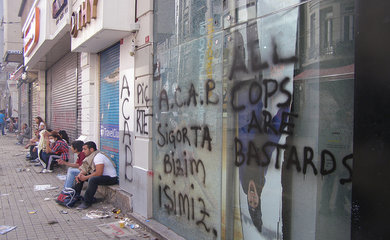On Sunday, Turkish Prime Minister Recep Tayyip Erdogan climbed onto a bus in Ankara, Turkey in front of a crowd of raging protesters and warned that his patience with the protests—that are now in their tenth day—was quickly running out.
“Those who do not respect this nation’s party in power will pay a price,” he later said to a crowd of screaming loyalists.
For the past eleven days, hundreds of thousands of people across Turkey—and in solidarity around the world—have taken to the streets, demonstrating against Prime Minister Erdogan and his Justice and Development Party (AKP)’s government, which, while democratically elected, in practice has a totalitarian-esque policy of crushing dissent even in its smallest forms. This has been made abundantly evident over the past eleven days as the Turkish police force—the largest and one of the most fascist in Europe—responded to the protesters by shooting teargas from water cannons and firing rounds of rubber-coated steel bullets. Hundreds of people have been injured and hospitalized, due to being hit with teargas canisters and rubber-coated bullets at close range and three have died. In addition to these casualties, six of the policeman who were a part of the crackdown have committed suicide.
While the protests started in Gezi Park in Istanbul’s central Taksim Square—and was largely mischaracterized as an environmental protest—they quickly spread to other cities around Turkey. While the initial gathering was meant to protest the plan to build a shopping mall over Gezi Park in Taksim Square, they quickly exploded into a massive uprising against Prime Minister Erdogan’s leadership and phony democracy. After all, Taksim Square is the site of all of Istanbul’s dissent—from LGBT rights rallies to protests demanding Kurdish rights and the recognition of the Armenian genocide to demonstrations calling for Internet freedom. In a way, even when the protests were 50 activists stopping the bulldozers from destroying Taksim Square, it was their democratic space they were protecting—in this way, the protests were about democracy the whole time.
Still, as these protests repeatedly make the headlines around the world, showing once post-card perfect images of Istanbul shrouded in clouds of teargas with the bright light of flash-bang grenades punctuating the night sky, it is unsettling that this is the first that the west is hearing media coverage of Turkey’s democratic failings. Western Europe saw Turkey—particularly Istanbul—as the perfect vacation destination for European travelers who were looking for somewhere simultaneously exotic and comfortable. Turkey was foreign, yet—for many Europeans who worship at the altar of secularism—enlightened.
The United States goes so far as to promote the “Turkish Model”—of economic liberalism, secular politics and western-friendly relations for post-Arab Spring countries of the Middle East, looking towards a democratic future. However, the past eleven days have proven this western-friendly “Turkish Model” of “democracy” a complete farce.
While Prime Minister Recep Tayyip Erdogan and the ruling Justice and Development Party (AKP) were elected in a free and fair election—thus separating the Turkish protests from the uprisings against the dictatorships of Tunisia, Egypt, Libya, Yemen, Bahrain and Syria—democracy as a practice in Turkey stops here.
According to the World Press Freedom Index, Turkey ranks a dismal 154—following countries like Iraq and Afghanistan, who the United States frequently berates as undemocratic. Worse still, according to the Committee to Protect Journalists, Turkey jailed 76 journalists last year alone—more than both China and Iran. The vast majority of these journalists—70 percent—were Kurdish, or working for Kurdish media outlets and charged with aiding a terrorist organization such as the Kurdish Worker’s Party (PKK). This fear of arrest for minorities in Turkey—particularly the Kurdish population—is exacerbated amongst politicians and political activists.
This fear of targeting, arrest and imprisonment has affected the Turkish Press to the point that self-censoring is common, as an incomplete story is more appealing to most journalists than the alternative of being arrested, and often jailed for months without trial. This extreme political and cultural censorship of the press has highly affected the media discourse on the protests; during last week’s protests, as unarmed protesters were attacked by the police to the point of injury and death, CNN Turkey ran a documentary about penguins.
Still, in the absence of a functional press, Turkish activists and journalists have turned towards independent and social media, using the Internet as a means to pass on photographs, news articles and build global solidarity. Prime Minister Erdogan has proclaimed Twitter a “menace”—it is no coincidence that 25 people have been arrested solely for tweeting the protests, as in the eyes of Erdogan’s government this qualifies as, “inciting public hatred and animosity.”
Prime Minister Erdogan has pushed for inclusion in the European Union and encourages liberal economic policies that promote competition and capitalism. It is no wonder the United States government has remained largely uncritical of him over the past 10 days—he ascribes to their global capitalist doctrine which forgives censorship of the press and imprisonment of journalists and activists.
However, for the rest of the world, over the past eleven days Erdogan’s façade has been shattered.
Photo by resim77, Licensed under a Creative Commons Attribution 2.0 Generic license.

